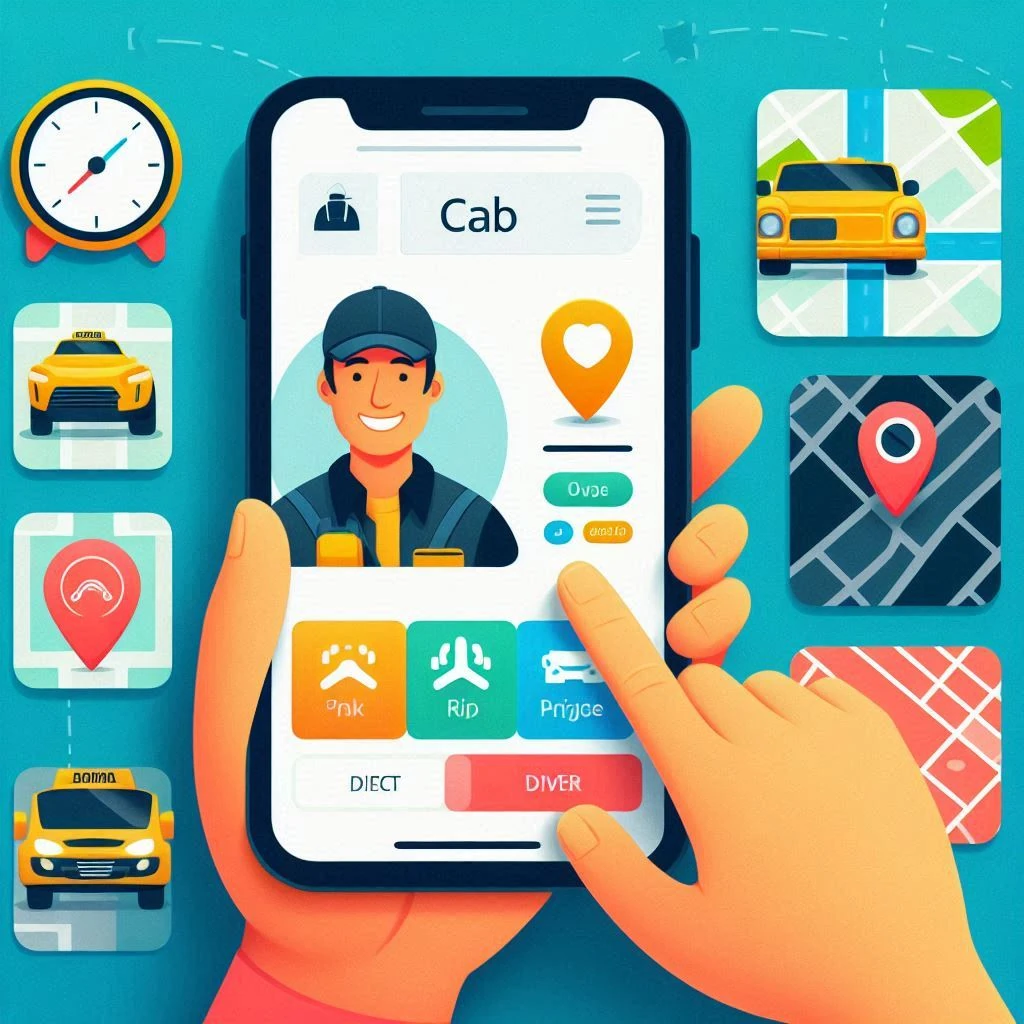Cab Booking apps have revolutionized how we travel, providing convenient and quick transportation at our fingertips. Among these, Uber stands out as a pioneer. There are many apps like Uber or Uber alternatives that offer similar and sometimes better services. These apps have made it easier to get around, reduced the need for personal cars, and provided flexible job opportunities for many. This article will compare the top apps like Uber, and examine their unique features and benefits. Whether you’re a frequent traveler or a casual user, grasping these options can aid in selecting the optimal service for your needs.

How Online Cab Booking Services Work
Cab booking services operate by seamlessly connecting passengers with available drivers through mobile apps or websites. Passengers start by registering an account, providing personal details, and a payment method. To book a ride, they open the app, set their pickup location (usually detected via GPS), enter their destination, and select the type of vehicle they require, from standard to premium options.
The app then searches for nearby drivers, and once a driver accepts the ride request, the passenger receives the driver’s details, including name, vehicle model, and license plate number. Passengers can track the driver’s real-time approach on a map within the app. During the ride, they can monitor the route and the estimated arrival time. Upon reaching the destination, the fare is automatically charged to the registered payment method, and a detailed receipt is provided. Both passengers and drivers can rate each other, influencing future ride availability and quality. The system leverages GPS for accurate tracking, sophisticated algorithms for efficient driver-passenger matching and dynamic pricing, and adheres to local regulations for driver and vehicle compliance to ensure safety and reliability.
Uber: A Case Study

Uber, the revolutionary cab booking app, has fundamentally transformed how we navigate cities and travel from point A to point B. Born in 2009 as UberCab in the bustling streets of San Francisco. It quickly evolved into the global behemoth we know today as Uber.
Journey from Innovation to Household Name
Founded by Garrett Camp and Travis Kalanick, Uber emerged at a time when traditional taxi services were the norm. Its disruptive model, allowing anyone with a car to become a driver, captured the imagination of urban dwellers worldwide. Within a year of its inception, Uber rebranded and expanded its operations beyond San Francisco, igniting a transportation revolution.
Redefining Convenience with Key Features
Uber’s success lies in its ability to cater to diverse needs. Whether it’s a solo ride to work, a shared journey with friends, or even a gourmet meal delivered to your doorstep, Uber has it covered. From UberX offering affordable rides to Uber Eats satisfying hunger pangs, the app has become synonymous with convenience and reliability.
Global Impact and Challenges
Operating in over 70 countries and 10,000 cities, Uber has left an indelible mark on the transportation landscape. However, its journey hasn’t been without hurdles. Legal battles, regulatory scrutiny, and concerns over driver classification have tested Uber’s resilience. Yet, it continues to innovate, adapt, and shape the future of urban mobility.
Driving Innovation for Tomorrow
Uber’s commitment to innovation is unwavering. From investing in autonomous vehicle technology to exploring futuristic concepts like flying taxis through Uber Elevate, the company is at the forefront of revolutionizing transportation. Moreover, initiatives like Uber Green underscore its dedication to sustainability and reducing environmental impact.
Learn more – What is Uber; how does it work
Top Alternatives to Uber

While Uber remains a dominant force in the cab booking industry, several alternatives offer comparable services and unique features. Let’s explore each of these best Uber alternatives in detail:
Lyft
Lyft is a popular cab booking app known for its friendly service and availability in many US cities. Founded in 2012, Lyft has quickly become one of Uber’s primary competitors in the United States. The app offers various ride options, including standard rides, shared rides (Lyft Line), and luxury options like Lyft Lux and Lyft Lux Black. Lyft’s user-friendly interface, affordable pricing, and focus on community engagement have helped it gain a loyal user base.
Bolt (formerly Taxify)
Bolt, formerly known as Taxify, is a well-established player in the cab booking industry, particularly in Europe and Africa. Founded in 2013 in Estonia, Bolt has expanded its operations to over 40 countries, offering affordable and reliable transportation services. Similar to Uber, Bolt provides a range of ride options, including standard rides, XL rides for larger groups, and Bolt Business for corporate clients. With competitive pricing and a straightforward app interface, Bolt is a popular choice for commuters and travelers in its operating regions.
DiDi Chuxing
DiDi Chuxing, often referred to as DiDi, is the largest cab booking platform in China and one of the world’s leading transportation companies. Founded in 2012, DiDi serves millions of users across China, offering a wide range of services, including standard rides, carpooling (DiDi Hitch), premium rides (DiDi Premier), and taxi hailing. DiDi’s advanced technology, efficient service, and extensive coverage make it the go-to choice for transportation in China’s urban centers.
Grab
Grab is Southeast Asia’s leading cab booking and on-demand services platform, operating in countries like Singapore, Malaysia, Indonesia, Thailand, Vietnam, and the Philippines. Founded in 2012 in Malaysia, Grab offers various services, including GrabCar (private car rides), GrabTaxi (taxi hailing), GrabBike (motorbike rides), GrabFood (food delivery, similar to Uber Eats), and GrabExpress (parcel delivery). With its wide range of services, competitive pricing, and commitment to safety, Grab has become an integral part of daily life for millions of Southeast Asians.
Ola
Ola is one of India’s largest cab booking platforms, offering a diverse range of transportation services across the country. Founded in 2010, Ola operates in over 250 cities, providing options such as auto-rickshaws, bikes, rental cars (Ola Rentals), and outstation rides (Ola Outstation), in addition to standard rides. Ola’s focus on affordability, accessibility, and innovation has made it a preferred choice for Indian commuters seeking convenient transportation solutions.
Curb
Curb is a unique alternative to Uber that connects users with licensed taxi services in various cities across the United States. Established in 2007 as Taxi Magic and later rebranded as Curb, the app allows users to book rides from traditional taxis and pay through the app. With Curb, users can enjoy the convenience of ride-sharing while supporting licensed taxi drivers and businesses, making it an appealing option for those who prefer the reliability and familiarity of traditional taxi services.
Gett
Gett is a cab booking app that specializes in corporate transportation solutions, offering efficient and reliable rides for businesses and professionals. Founded in 2010, Gett operates in over 100 cities worldwide, providing services like pre-booked rides, on-demand rides, and centralized billing for corporate clients. With features tailored to meet the needs of business travelers, including advanced scheduling options and dedicated account management, Gett simplifies corporate travel management and enhances productivity for its users.
BlaBlaCar
BlaBlaCar is a long-distance carpooling platform that connects drivers with empty seats to passengers traveling in the same direction. Founded in 2006 in France, BlaBlaCar has expanded its operations to over 22 countries, offering a cost-effective and eco-friendly alternative to Uber and Lyft, like traditional transportation methods. With its extensive network of drivers and passengers, BlaBlaCar provides a convenient way for travelers to share rides, reduce costs, and make new connections while journeying between cities and countries.
Read more: BlaBlaCar Business Model
Via
Via is a shared ride service that aims to revolutionize urban transportation by optimizing routes and matching passengers traveling in the same direction. Founded in 2012 in New York City, Via operates in several cities across the United States and internationally, offering flat-rate fares for shared rides in high-capacity vehicles. With its advanced algorithms and commitment to efficiency and sustainability, Via provides affordable and environmentally friendly transportation options for commuters and city dwellers alike.
Comparative Analysis of Uber App Alternatives
Cab booking has become an integral part of modern transportation, offering convenience and flexibility to millions of users worldwide. While Uber remains a dominant force in the industry, there are several apps like Uber that provide similar services with unique features and benefits. In this detailed comparative analysis, we will explore the key aspects of Uber and its top competitors, including Lyft, Bolt, DiDi Chuxing, Grab, Ola, Curb, Gett, BlaBlaCar, and Via.
Price Comparison
Uber’s pricing structure is known for its dynamic pricing model, which adjusts fares based on demand. This can lead to higher costs during peak hours but offers flexibility for both riders and drivers. In comparison, Lyft generally maintains consistent pricing with occasional surge pricing, making it a popular choice for users seeking affordability. Bolt also offers competitive rates and frequent discounts, attracting price-conscious riders. DiDi Chuxing, Grab, and Ola provide competitive pricing in their respective regions, with promotional offers to incentivize usage. Curb follows standard taxi fares, while Gett offers competitive fixed pricing without surge pricing. BlaBlaCar uses a cost-sharing model, making it an economical option for long-distance travel. Via’s flat fare structure ensures affordability for shared rides.
Availability and Coverage Areas
Uber boasts the most extensive global coverage, operating in over 900 metropolitan areas worldwide. However, competitors like DiDi Chuxing and Grab dominate specific regions, such as China and Southeast Asia, respectively. Lyft primarily serves the United States and Canada, while Bolt operates in Europe and Africa. Ola focuses on markets in India, Australia, New Zealand, and the UK. Curb is popular in major U.S. cities, especially New York. Gett operates in Israel, Russia, and select U.S. cities. BlaBlaCar serves Europe, Mexico, Brazil, and India, while Via operates in major cities across the U.S., Europe, and Australia.
Unique Features
Each ride-sharing app offers unique features tailored to different user preferences and market demands. Lyft stands out for its community-focused approach and safety measures, while Bolt emphasizes affordability and extensive coverage. DiDi Chuxing integrates multiple transportation modes, including bike-sharing and luxury car services, providing users with diverse options. Grab offers a comprehensive range of services like GrabCar, GrabBike, and GrabFood, catering to various needs in Southeast Asia.
Ola provides services such as Ola Mini, Ola Prime, and Ola Auto, catering to the Indian market. Curb offers traditional taxi services with the convenience of app-based booking, popular among users in major U.S. cities. Gett specializes in corporate ride services and competitive fixed pricing. BlaBlaCar focuses on long-distance carpooling, connecting travelers across different regions. Via offers shared rides with efficient routing, ensuring affordability and convenience for users.
User Experience and Ratings
High user satisfaction ratings across all platforms indicate strong service quality and reliability among ride-sharing apps. Uber’s intuitive interface and widespread adoption have contributed to its high user ratings worldwide. Lyft’s community-focused approach and safety measures have earned praise from users, resulting in positive feedback and repeat usage. Bolt’s affordability and fast service have resonated well with riders, reflected in its high user satisfaction ratings. DiDi Chuxing’s seamless experience and advanced technology have garnered praise from passengers and drivers alike.
Grab’s comprehensive service offerings and reliability have led to high user satisfaction in Southeast Asia. Ola’s diverse options and availability have contributed to its positive user feedback in India and other markets. Curb’s convenience for traditional taxi users and reliable service have been appreciated by riders in major U.S. cities. Gett’s reliability and corporate service offerings have received positive reviews from users. BlaBlaCar’s cost savings and social interactions during rides have led to high user satisfaction among travelers. Via’s affordability and efficiency in shared rides have earned praise from users in major cities across different regions.
Promotional Offers and Discounts
Promotional offers and discounts are common among ride-sharing apps, providing incentives for users to choose one platform over another. Uber frequently provides discounts and referral bonuses to attract new users and retain existing ones. Lyft offers ride credits and priority pickups for loyal users through its Lyft Rewards program.
Bolt runs referral programs and seasonal discounts to incentivize usage. DiDi Chuxing offers various local promotions and discounts to attract users in different regions. The GrabRewards loyalty program provides discount vouchers and other perks to Grab users. Ola Money and Ola Select membership offer premium benefits and discounts to Ola users. BlaBlaCar offers membership discounts and referral bonuses to users. Via offers ride credits and discounted group rides to users.
Safety and Security Features in Cab Booking Apps

Ensuring the safety and security of both passengers and drivers is paramount for ride-sharing apps. Here’s how these platforms implement various features to enhance safety:
Background Checks
Ride-sharing companies conduct thorough background checks on drivers before they are approved to operate on the platform. These checks typically include criminal background checks, driving record checks, and verification of identity and vehicle registration. By screening drivers, ride-sharing apps aim to ensure that only qualified and trustworthy individuals are allowed to provide rides to passengers.
SOS Features
Many ride-sharing apps are equipped with SOS (emergency) features that allow users to quickly call for help in case of an emergency. These features typically enable users to contact emergency services directly from within the app with the touch of a button. In some cases, users can also share their location with trusted contacts or with the ride-sharing company’s support team to alert them of any safety concerns.
In-App Emergency Assistance
In addition to SOS features, ride-sharing apps offer in-app emergency assistance to passengers and drivers. This may include dedicated customer support lines staffed by trained professionals who can assist users in emergencies. Users can report safety concerns or incidents directly through the app, and the ride-sharing company will take appropriate action to address the issue and ensure the safety of everyone involved.
Safety Education and Resources
Ride-sharing apps often provide safety education and resources to both passengers and drivers to promote safe and responsible behavior. This may include tips for staying safe while using the app, information on how to recognize and report suspicious activity, and resources for accessing support services in case of emergencies. By empowering users with knowledge and resources, ride-sharing apps aim to create a safer environment for everyone.
Real-Time Monitoring and Tracking
Some ride-sharing apps use real-time monitoring and tracking technology to ensure the safety of passengers and drivers during rides. This may include GPS tracking of vehicles and real-time monitoring of driver behavior to detect any deviations from the expected route or unsafe driving practices. By monitoring rides in real-time, ride-sharing companies can quickly identify and respond to any safety concerns that arise.
Collaboration with Law Enforcement
Ride-sharing apps collaborate with law enforcement agencies to enhance safety and security measures. This may include sharing information about safety incidents or suspicious activity with local authorities and cooperating with investigations into safety-related incidents. By working closely with law enforcement, ride-sharing companies can help ensure that appropriate measures are taken to address safety concerns and protect users.
Economic Impact of Taxi Booking Apps

The emergence of cab booking apps has sparked significant changes in the transportation industry, influencing traditional taxi services, job creation dynamics, and the financial landscape for drivers.
Impact on Traditional Taxi Services:
Online cab booking service apps have disrupted the traditional taxi industry by offering a more convenient, cost-effective, and technology-driven alternative. Traditional taxi services, which once dominated urban transportation, have experienced a decline in market share and revenue as consumers increasingly opt for cab booking options. This shift has forced taxi companies to adapt their business models, improve service quality, and implement technological innovations to remain competitive in the changing landscape.
Job Creation and Gig Economy Implications
Online cab booking apps like Lyft and Uber have played a pivotal role in the rise of the gig economy, providing flexible earning opportunities for individuals seeking supplementary income or alternative employment options. By allowing drivers to work on their own schedules and use their personal vehicles as assets, cab booking platforms have democratized access to employment and empowered millions of drivers worldwide. However, the gig economy nature of cab booking work also raises concerns about job security, benefits, and labor rights, as drivers typically operate as independent contractors without the traditional protections afforded to employees.
Financial Aspects for Drivers
For drivers, ride-sharing presents both opportunities and challenges in terms of earnings, incentives, and financial stability. While cab booking companies offer drivers the potential to earn a decent income, earnings can vary significantly based on factors such as location, time of day, driver expenses, and demand fluctuations. Ride-sharing platforms often incentivize drivers to stay active on the platform through bonuses, surge pricing during peak hours, and referral programs. However, drivers also face challenges such as vehicle maintenance costs, fuel expenses, insurance premiums, and wear and tear on their vehicles, which can impact their overall profitability and financial well-being.
TL;DR – Apps like Uber and its alternatives
Ride-sharing apps like Uber have revolutionized how we navigate cities, offering convenience and flexibility. However, apps like Uber such as Lyft, Bolt, DiDi Chuxing, Grab, and Ola provide similar services with unique features tailored to specific regions and preferences. While Uber boasts global dominance, competitors excel in diverse markets, pricing strategies, and service offerings like shared rides, food delivery, and corporate services. Safety, user experience, and affordability are key priorities for all apps, driving continuous innovation in the transportation industry. As ride-sharing evolves, it remains a cornerstone of the gig economy, offering flexible earning opportunities for drivers worldwide.
How to make your own Ride-Sharing app similar to Uber?
After going through these interesting facts about Uber and its alternatives, if you also want to make a similar ride-sharing platform,m then check out BooknRide at an affordable price.

